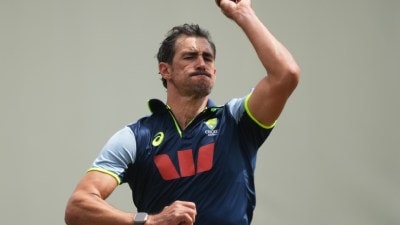Stay updated with the latest - Click here to follow us on Instagram
Bringing hope through squash
Last year in August,when trials for the selection of players for Khelshala- an academy set up under the banner of 'Mind,Body...
Harvard Universitys women squash team is in Chandigarh to train underprivileged children at Khelshala
Last year in August,when trials for the selection of players for Khelshala- an academy set up under the banner of ‘Mind,Body,Game (MBG) Connection’ founded by renowned squash coach Satinder Bajwa- were held,Pooja Kumari was not even aware that a sport like squash existed. Like her,several other children from Attawa village had come out of sheer curiosity to check what was going on in their locality.
Four months later her apprehensions about the sport have all gone,and now it has become a part of her everyday life. “I had never heard about a sport called squash in my life till I joined Khelshala. Before that I had no clue what forehand or backhand was. I just used to loiter around the locality and spend time with my friends. But after joining Khelshala my life has become better and I could even see changes in my lifestyle. I have also grown in confidence,” said Pooja,daughter of a kabadi wala.
But Friday was different from other days as for the first time these under-privileged children got a chance to interact with players from foreign countries- something which these children had never dreamt of. “We never thought we would get a chance to talk and play against a foreign player. Today the wish has come true. Moreover,these foreign players were warm towards us and we had a good time with them,” said Amit,a slum-dweller from Bapu Dham Colony.
It is after after Chennai and Delhi that the Harvard University women’s squash team has visited Chandigarh to foster a sense of bonding with the Indians. “I wanted these players to know how fortunate they are. Some of them are national champions in Sri Lanka,Wales and Canada,but I wanted them to know that there are millions of children out there who live in slums and don’t get proper meal to feed their mouth. It’s through squash that we want to help these underprivileged children improve their lifestyle. The girl’s team is delighted because they had never experienced such a thing before. I could see the excitement in their eyes. They have been warm to these kids,” Bajwa,head coach of the Harvard University squash team ranked No 1 at the inter-collegiate level in the United States,said.
Cecilia and Katherine,both students,agree with Bajwa. “This is our first visit to India and the experience has been overwhelming. We also have underprivileged children in the United States who are provided with coaching in squash,but it’s completely different here. We could see that these children have the passion and enthusiasm to learn the sport,” they said.
However,it is Chris Smith,the team’s assistant coach,who was hit the most by the experience as he wants to come back to India and do something for these underprivileged children.
“I am inspired to get involved with the children here. This is not my first and last trip to India . I will definitely come back to India and try to raise some money and send supplies to these kids. I am really moved by this programme. When we go back to America,I hope it will inspire the girls to volunteer and bring some smile in the lives of underprivileged children,” said Chris,an inhabitant of Boston.
Delighted to see his pupils burst into laughter,Bajwa shoots that besides squash these children are taught yoga and also given a helping hand in their home-work. “Squash has brought a smile on their innocent faces. I am also amazed to see how much these children have improved in four months despite spending only two-three hours twice or thrice a week in the court.
My only regret is that I am so busy with my work that I don’t time to talk to these children. However,I could see a lot of improvement in their games since we started. Squash may not be a popular sport among the masses but it’s still a difficult game. I hope to see these young children develop into fine players in the next two-three years,” Bajwa,who was manager and mentor of eight-time world squash champion Jansher Khan,said.







